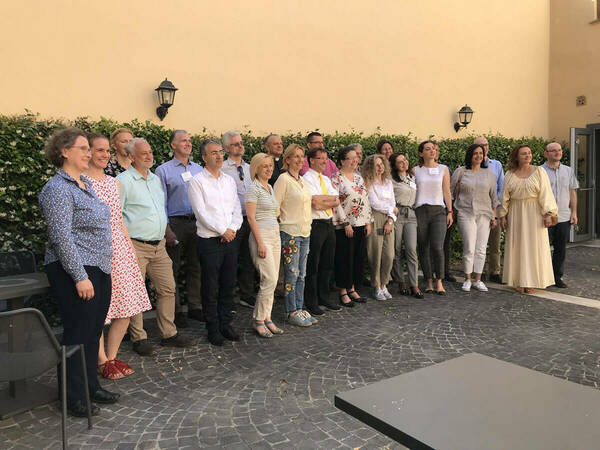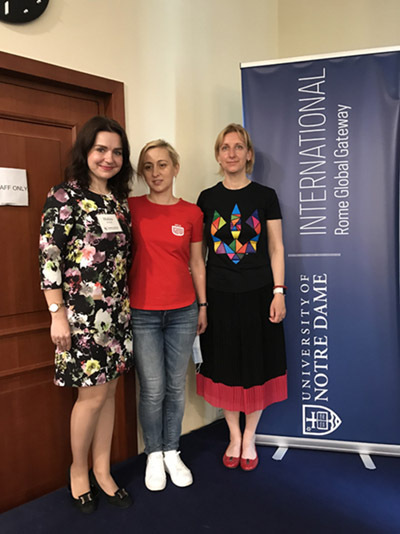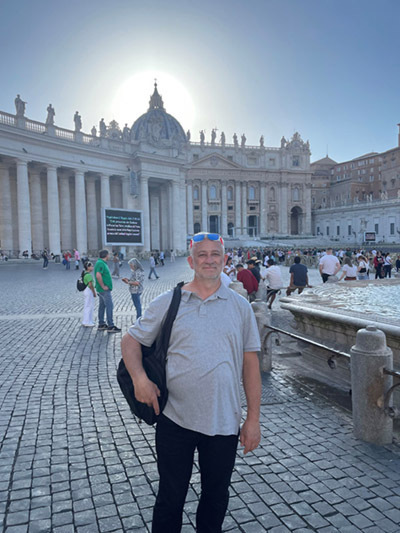
Gordan Črpić is Vice Rector for organization and financial affairs at the Catholic University of Croatia. In May 2022, he was one of almost two dozen leaders from six Catholic universities in Central and Eastern Europe who convened to reflect on “Building Resilience into Leadership” during a three-day retreat in Rome. The program began with a reflection on the war in Ukraine by Ukrainian scholars, and offered a spiritual retreat and variety of practical lectures on leadership. The retreat was convened by the Nanovic Institute for European Studies as part of the Catholic Universities Partnership initiative. The program was made possible by generous external grants, including from the United States Conference of Catholic Bishops.
I would like to begin by thanking everyone who made it possible for us to meet in Rome after such a long period during which, due to the COVID-19 pandemic, we were not able to gather together. This program had two dimensions for me, two levels of refreshment: spiritual and intellectual.
The spiritual refreshment was not only abstract, it was also very concrete. Since I work as a vice rector responsible for organization, I know that the organization of an event is usually only noticed when something has not been well organized. When an event is well organized, everything seems “normal,” and no one, except those who have been involved in organizing something similar themselves, see what was done in the background to make this work invisible. So thank you for the invisibility of the organization of this event.

I would also like to thank the brave women from Ukraine, Sophia Opatska, Svitlana Khyliuk, and Halyna Protsyk! Sophia, Svitlana, Halyna, you are so brave! Keep on being brave! We are with you. I would like to say that we will stand in solidarity with you.
One Croatian theologian, Špiro Marasović, defined solidarity as the willingness of someone who wants to be in solidarity with someone else to take on that person’s risk. I do not know how much of this readiness exists in our Western civilization (I am also thinking of Eastern Europe), but we have reason to hope because we believe that God guides history. Despite our wish for comfort and convenience, which, I fear, will return to us like a boomerang, He will still find ways for great good to come out of this suffering of the Ukrainian people. Our Ukrainian colleagues designed the introduction to the program very well with their testimony, and then their reflections on text from the Gospel. During this presentation, I noted down a few reflections of my own, but what I experienced is more important than what I wrote down: I stopped and gave myself time to go back to a time and space with a past and a future, not just an unrelenting present.
When it comes to the second dimension of the program — the intellectual refreshment, exchange of thoughts, the ideas, views, and body language of another person after two years of indirect communication — my experience confirmed what we already knew through organizing symposia, round tables, conferences, summer schools, and seminars: that the meeting of living people in person cannot be replaced by anything else. We already knew this but, after living through a long period of Covid-induced isolation, we now have experiential confirmation that this is the case.
The presentations, prepared for us by excellent lecturers, were outstanding and stimulating. They were well thought out, from discussions of spiritual awakening and preparing to meet reality, to lectures that helped me see what we have done well, what good practices I apply, what has gone wrong, and what we could do better and differently. The retreat confirmed some of the good practices that we already have in place, including our practice of caring, not only about excellence, but of looking for models that will also help those who are less than excellent, in less advantageous economic conditions, or simply in a life situation that does not allow them to devote themselves completely to their studies. It is already good practice that we do not reject people in these situations but look for ways to help them master their programs of study, try to create a good working environment, and raise the level of trust, which, in former communist countries, has been particularly damaged.
Our discussions in Rome also helped me realize that some people whose work I, as their supervisor, have been dissatisfied with, are more in need of my help than my criticism. I admire the Benedictine idea, which I had forgotten about, that a discussion should begin with the younger and more inexperienced interlocutor. I greatly appreciated the approach of the lecturers who brilliantly presented their models that were supported not only by theories but also by examples from their own lives, and the way in which they asked us to try to apply the models to our situation. These methods meant that the lectures were not only academically accurate, they were also useful practical lectures that we can use in the management of our universities. This was valuable and praiseworthy and is the standard of the lectures that I have come to expect from the institution and the invited lecturers, and I hope that this practice will continue.

The greatest benefit of the Rome program, however, was not the excellent lectures, but something even more important: the meeting, the coming together of people from Eastern Europe with each other and with people from the West. I was interested to observe that those of us who have had the misfortune of living under communism completely understand each other, even without much conversation, and I see that we do have the words to convincingly convey what we have witnessed to our colleagues in the West.
This tells me two things: that the trauma of communism, which remains within us, is strong, and that we still speak from a place of trauma with strong emotions and an inability to articulate the seriousness and legacy of that totalitarian system with sufficient clarity. That system is “responsible” for the death of four to five times more people than Fascism and Nazism and the people who were killed by the communists are no less dead than those who were killed by the fascists. It is frightening that there are people who still think it was or it is a good system.
For the first time, thanks, unfortunately, to the Russian aggression against Ukraine, someone from the West really listened to me when I spoke about the “Serbian world,” the “Russian world,” the alternative construction of reality in totalitarian systems, the use of human and minority rights against the people, the dangers of establishing a double standard.
In the end, I could say that I did not leave Rome as an optimist. The situation is bad and it will probably get even worse. But, I did leave Rome full of hope. We were not just next to each other, we met each other, and it is a sign of hope and faith, that if we meet each other, with God's help, we will establish a peace that will be more than just the absence of war.
Originally published by at crossingthesquare.nd.edu on November 15, 2022.